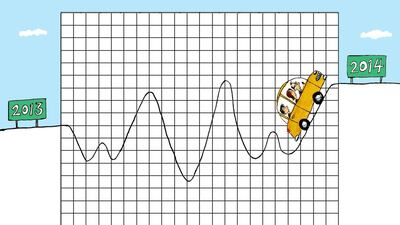As the year draws to an end, I've been thinking back over what issues resonated most with people from what I've written in this column, and it turns out that they mirror what our cashy.me community hones in on too.
The things that bring about the biggest reaction and requests have to do with what I call how-to information.
For example, how to save money, how to work out what reserves we need when we retire and how to figure out what our pensions should cover.
What this means is that people are saying: "Stop telling me what I should do and help me do it. Show me the way." They want financial empowerment rather than financial literacy.
By far the most common question is: "how can I save money?" We get emails from people divulging intimate details of life, expenses and incomes, with that basic request.
If only things were that simple.
The only true way of helping or guiding anyone when it comes to financial issues is not just knowing the stuff of how many children they have, whether they are supporting their in-laws, the lump sum they spend on their food or how much their car loan costs them. The only real way to get a handle on our outgoings is have detailed knowledge of what they do with their money every single day. In other words, it's about how they behave:
Where you eat, what you eat, why you're not packing your lunches and snacks. What brands you buy, where from, why. What it means to kick back and have downtime. In other words, how you choose to live.
Without that, there is no getting a grip on your finances, and by extension your life.
And the only way to do this is to keep a detailed record of every single purchase. This is no mean feat - it's boring, boring, boring - but it's incredibly important.
And it doesn't end there. Someone recently proudly showed me the budgeting software he uses to keep track of his expenses. He told me he's been doing it for three years. And that's impressive.
But he has done nothing with the information.
It's fantastic that he has that backlog of data, but without delving into it, finding out what's spent where and then zoning in on whether that's the best thing for his phase of life and where he wants to head, it's dead information.
Still, this guy's ahead of the game because he's trained himself to do what most shun: keeping a track of all his spending.
You see, the idea is to do it long enough for it to become habit. You need to stick with it rigorously for at least six months, I would say - and have happy thoughts while you do it instead of resisting and resenting it.
Gathering the information should be accompanied by analysing it. Then comes changing how you do things so that you can save money, get rid of debt, go on that trip, buy a house or whatever else your aim is.
But here's another thought: The real deal is that you do all this long enough until a point in time when you don't need to do it anymore. You become so financially empowered and secure that you no longer need the micro level of detail I describe.
By that point though, this habit of mindful spending and living will be so ingrained that you will continue to live mindfully while being financially independent. Congratulations.
Another example of something that resonated is when I wrote about how to calculate the stash of cash you need when you retire. A quick reminder: you simply calculate the sum total of your annual spending and multiply it by 25. That gives you a lump sum - it can be a scarily big lump sum - that you need to have available in various guises. This is what you'll live off for the rest of your life.
The idea is that 4 per cent of that lump sum is what your annual spending will be. It is what personal finance advisers believe is the safe withdrawal rate - in other words, what we can spend without depleting the capital that generates it in the first place.
Jaws collectively drop when I bring this up in talks because it brings a much-needed reality check. It's one thing to talk theory, but another to start using real numbers that are our life's work and expenses.
What I have learnt, over and over again, is that it's all about what we do, not what our intentions are, or what we say we'll do.
The other important thing is that it all starts with, and is based on, the boring but important keeping track of our spending: gathering data, analysing it and reacting to it.
We all make mistakes. We all look back and think 'if only'. But instead of lamenting, how about learning.
This is an era of change across this region. What's your big change going to be?
Nima Abu Wardeh is the founder of the personal finance website cashy.me. You can reach her at nima@cashy.me.

Write down this advice: write everything down
The only way to get a proper grip on your finances is to keep a detailed record of every single purchase.
Most popular today
